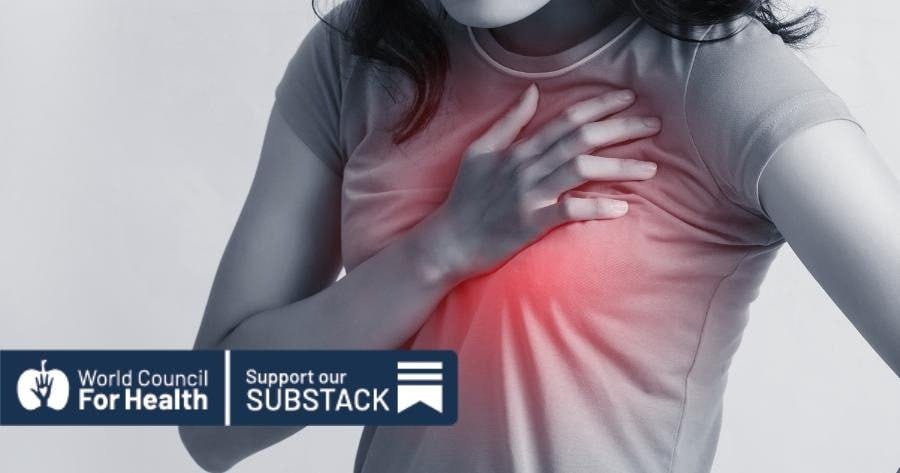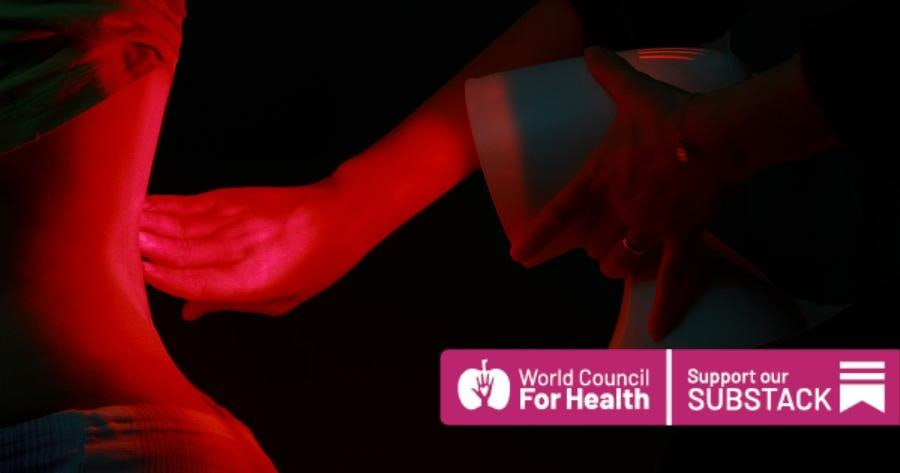Can red light therapy mend our children's hearts?
New research is revealing the extent to which Covid injections have harmed children. But red light therapy offers a beacon of hope.
A groundbreaking study has shed new light on the risks of myocarditis following Covid-19 vaccinations. Led by Professor Colm D. Andrews of Oxford University and published as a preprint in MedRxiv, the study analyzed data from over 1.7 million children in England and found that myocarditis and pericarditis occurred exclusively in vaccinated children. Not a single unvaccinated child in the study was diagnosed with these conditions.
The study also revealed that the vaccine's effectiveness waned significantly after 14 to 15 weeks, raising questions about the risk-benefit analysis for vaccinating children, who are at minimal risk of severe Covid-19 outcomes.
Even more alarming, a separate report highlighted a 500% increase in deaths among vaccinated children compared to their unvaccinated peers. These findings have sparked outrage and renewed calls for transparency and accountability in public health decision-making.
What is myocarditis, and why is it dangerous?
Myocarditis is an inflammation of the heart muscle that can lead to serious complications, including arrhythmias, heart failure, and sudden cardiac death. Pericarditis, inflammation of the sac surrounding the heart, often accompanies myocarditis. Both conditions can result from viral infections, but they are increasingly linked to immune responses triggered by Covid-19 vaccines.
According to the study, 27 cases of myocarditis occurred per million vaccinated individuals after the first dose, dropping to 10 cases per million after the second dose. While these numbers may seem small, the long-term consequences of heart inflammation are profound. As Dr. Peter McCullough, a prominent cardiologist, noted, "Myopericarditis is never mild because inflammation and scarring in the heart, no matter how small, can set up a young person for the lifelong risk of heart failure and cardiac arrest."
Myocarditis often gets missed - and that’s a problem
One of the most concerning aspects of vaccine-induced myocarditis is that many cases may go undiagnosed. Standard diagnostic tools like EKGs and echocardiograms often miss subtle signs of heart inflammation. Cardiac MRI, the gold standard for detecting myocarditis, is rarely used in routine follow-ups.
A 2022 study published in The Lancet found that 81 out of 151 patients who underwent cardiac MRI showed heart abnormalities, such as late gadolinium enhancement—a marker linked to worse outcomes, including heart failure and sudden cardiac death. This suggests that the true incidence of myocarditis post-vaccination may be significantly higher than reported.
Infrared therapy: a promising treatment approach
While the medical establishment scrambles to address the growing crisis of vaccine-induced myocarditis, alternative therapies are gaining attention. One such approach is infrared therapy, which has shown promise in reducing inflammation and promoting tissue repair.
How infrared therapy works
Infrared therapy uses specific wavelengths of light to penetrate tissues, stimulating cellular repair and reducing inflammation. Studies have demonstrated its efficacy in treating cardiovascular conditions, including myocardial infarction (heart attack) and myocarditis.
For example, a 2024 study published in Biomaterials highlighted the use of near-infrared II (NIR-II) nanoprobes for early diagnosis and targeted treatment of myocarditis. The therapy was shown to reduce inflammatory markers and improve heart function in preclinical models.
Further reading…
Another study in Scientific Reports (2022) used hyperspectral imaging to quantify inflammatory cells in myocarditis, paving the way for non-invasive monitoring and treatment using infrared technology.
Potential benefits for myocarditis patients
Reduced inflammation: Infrared therapy can modulate the immune response, reducing the inflammatory cascade that damages heart tissue.
Improved blood flow: By enhancing microcirculation, infrared therapy can help deliver oxygen and nutrients to damaged heart cells.
Tissue repair: The therapy stimulates mitochondrial activity, promoting cellular repair and regeneration.
While more research is needed to establish standardized protocols, infrared therapy offers a non-invasive, low-risk option for managing myocarditis and its complications.
A call for transparency and action
The findings from the Oxford study and others underscore the need for a thorough reevaluation of Covid-19 vaccination policies, particularly for children and adolescents. As Dr. Kirk Milhoan, a pediatric cardiologist, aptly put it, "Even a small risk of heart inflammation for adolescents who are not at risk from Covid-19 is too much."
Public health agencies must prioritize transparency, providing accurate data to enable informed decision-making. Additionally, researchers and clinicians should explore innovative treatments like infrared therapy to mitigate the long-term consequences of vaccine-induced myocarditis.
A beacon of hope
The Covid-19 pandemic has left a complex legacy, and the issue of vaccine-induced myocarditis is a stark reminder of the importance of balancing risks and benefits. The collateral damage to some individuals cannot be ignored.
Infrared therapy represents a beacon of hope for those affected by myocarditis, offering a potential pathway to healing and recovery. As we navigate this uncharted territory, let us prioritize science, compassion, and the pursuit of truth.
The World Council for Health stands for a better way.
References
Andrews, C. D., et al. (2024). Myocarditis and pericarditis following COVID-19 vaccination in children: A population-based study. MedRxiv. https://doi.org/10.1101/2024.xx.xx.xxxxxx
Jiang, Y., et al. (2024). CXCL9+ macrophage-targeted NIR-II aggregation-induced emission nanoprobes for early diagnosis of myocarditis. Biomaterials, 311, 123146.
Nehrbass, D., et al. (2022). Visible and near-infrared hyperspectral imaging quantifies CD3 and CD45 positive inflammatory cells in myocarditis. Scientific Reports, 12(1), 16320.
Redshaw, M. (2024). Major study of 1.7 million children finds myocarditis only in kids given COVID-19 vaccines. Reform Pharma. https://substack.com/profile/169517008-reform-pharma
Tenenbaum, H. C. (2023). Possible treatment approach for management of post-COVID vaccination-induced myocarditis. Unpublished manuscript.









